“Rajesh Talwar’s New Book: Transforming Education for India’s Global Future”
Rajesh Talwar, a former UN official turned consultant, lawyer, and acclaimed author, unveils “HARVARD, OXFORD AND CAMBRIDGE: THE PAST PRESENT AND FUTURE OF EXCELLENCE IN EDUCATION” (Ponytale Books). This thought-provoking book delves deeply into education reform, supporting the government’s ambition for high-quality education. It offers actionable guidance for policymakers aiming to elevate India’s global educational standards.
The book suggests ways in which Ed-Tech and artificial intelligence (AI) can radically transform education and bring about 100 percent literacy. It discusses how India can attract foreign students and makes the case for the entry of foreign universities It makes far-reaching recommendations that address the issues of expansion, equity, employability, and excellence within the Indian educational system.

An excerpt from Talwar’s book
Book excerpt – Pg 209-211
HELPING STUDENTS COPE WITH STRESS,ANXIETY AND DEPRESSION: THE NEED FOR INDIA TO ENGAGE WITH SUCH ISSUES
Students from Asia, including those from India, may experience greater parental pressure than students in western countries, but this does not mean that students in the West do not suffer from examination stress, anxiety and even depression. It is conceivable that students there are under even greater stress. It was a cultural shock for me to discover the existence of stress counsellors at Nottingham University, since we never had an equivalent at Delhi University.
All the same, a network of family and friends possibly provides greater cushioning than is commonly available in the West. A 2016 report suggests an unusual spike in anxiety and depression levels among students on US campuses. According to the report, record numbers of college students at the time were seeking treatment for depression and anxiety, and schools and colleges were unable to keep up with the demand.
At Nottingham I had wondered if students didn’t feel awkward about going to visit a counsellor at the university’s clinic. To an extent this was cultural conditioning from India that I subsequently overcame. I understood that, despite the awkwardness of the situation, the stress sometimes became simply too much and the students had no option but to cry out for help.
Kate Reilly writes on the US situation as below:‘From 2009 to 2015 the number of students visiting counselling centers increased by about 30% on average, while university enrolment grew by less than 6%, the Center for Collegiate Mental Health found in a 2015 report. Students seeking help are increasingly likely to have attempted suicide or engaged in self-harm, the Center found. In spring 2017, nearly 40% of college students said they had felt so depressed within the last twelve months that they had found it difficult to function, and 61% of students had said that they had “felt overwhelming anxiety” in the same time period, according to an American College Health Association Survey of more than 63,000 students at ninety-two schools’.
Factors that contributed to an escalated level of anxiety and depression were the recognition by students that they needed that college degree if they were to find a good job, and the related fact that fees had gone up, with many private universities charging 68,000 USD per year. With demand for services outstripping supply and long waiting lists for appointments, some universities have looked at technologyaided solutions.
What are we doing here in India to address such issues?
Precious little, perhaps. It is true that Ashoka University opened a Centre for Well Being on its campus that can be accessed by students and teachers alike, but one swallow does not make a summer. Hundreds of such centres need to be opened. Schools, too, must have counsellors for both children and teachers. Before that can happen, perhaps what we need in. India is an attitudinal shift in professors, students and parents to remove the stigma still associated with a person undergoing psychological stress and seeking expert advice.
Let us also not forget that there is a need to welcome the high-performing foreign students who come to our shores. As foreigners they are likely to face the stress of studying in a culture vastly different from their own. We need to open an office within our universities that deals with the concerns of foreign students, including their well-being and mental health.
About the author
Rajesh Talwar has written on a variety of themes ranging from social justice to law and culture for international and national magazines, newspapers, and websites including The Guardian, The Economic Times, the Pioneer, and Sunday Observer.
Excerpted from HARVARD, OXFORD AND CAMBRIDGE with the permission of the author and the publisher, Ponytale Books.

